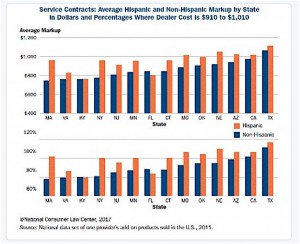This story has been updated with new information.
Auto dealers are once again being accused of implementing discriminatory sales practices. According to a new study, dealers raise prices on add-ons, such as extended warranties, dent protection and other items, to minorities, especially Hispanic buyers.
The National Consumer Law Center claims in a new study that these add-ons are typically sold at prices that were well above — in some cases more than 1,000% higher — the dealer’s costs.
“Our analysis demonstrates the negative consequences of opaque and inconsistent pricing of auto add-on products and the urgent need to bring transparency and consistency to this market,” said John W. Van Alst, director of the National Consumer Law Center’s Working Cars for Working Families Project and the report’s primary author.
“Our findings also reveal the troubling practice of dealers charging Hispanic customers more for the same product.”
(NADA chief warns makers about unfair sales practices. For the story, Click Here.)
The study, Auto Add-Ons Add Up, examined add-on sales data from about 3 million products from September 2009 through June 2015 at about 3,000 dealerships across the U.S. It’s biggest finding was that “Add-ons lead to unreasonably high and inconsistent pricing, and Hispanic customers were charged more.”
However, the National Automobile Dealers Association says that these add-ons provide value to vehicle owners.
“Voluntary protection products are incredibly valuable for millions of consumers – just ask consumers who were made whole by gap insurance on the total loss of their vehicles due to Hurricanes Harvey and Irma,” said Jared Allen, senior director, Media Relations, NADA.
“But the NCLC’s approach of limiting consumer discounts on these products would only make them more expensive and harder to obtain for many consumers. When six in 10 Americans don’t have enough savings to cover a $500 emergency expense, we should be working to make these voluntary products more accessible and affordable, not less.”
The study also urged some public policy recommendations that would make pricing more transparent. For example, one customer in Kentucky who paid $299 for window etching never knew that another customer at the same dealership paid $1 for the same product.
Other findings included:
- Add-on products were sold at prices far above dealer costs. For example, the average markup for service contracts was 83% and for window etching 325%, while independent auto insurance agents’ commissions average 11-18%.
- Dealers not only products with significant mark ups, but pricing was not consistent. One Michigan dealer was charging customers $349 to $5,000 for window etching even though the dealer’s cost was just $50.
- Dealers inconsistently priced add-on products, which led to pricing discrimination. Hispanics were charged higher markups than non-Hispanics. Individual dealerships charged some consumers many times more than other consumers for the same product for which the dealer’s cost was fixed.
The Michigan Automobile Dealers Association denies the claims set forth in the study, claiming the price discrepancies are simply the free-market system at work. However, earlier this month at the head of the National Automobile Dealers Association Mark Scarpelli chided automakers for providing incentives that were confusing and that led to different prices for the same vehicle.
(Click Here for details about VW getting approval to repair 3.0-liter diesels.)
“Not being able to offer two customers the same price on the exact same equipped vehicle, just because they came into the dealership on different days of the month, destroys consumer confidence,” he said during a presentation to the Automotive Press Association in Detroit.
He noted that the expansion of these strategies would only have negative consequences for dealers and automakers in the long run.
“In a world where customers rightfully expect fairness and transparency in price, why do so many manufactures still deploy unfair marketing strategies that produce huge discrepancies in price between various customers – discrepancies that aren’t transparent, that can’t be explained rationally, and that run afoul of everything our customers really care about?”
This push apparently doesn’t apply to these extras that dealers usually offer as the deal is winding up and buyers are more anxious to complete and get behind the wheel of their new vehicle, leading some to make poor choices, claim advocacy groups.
“The fact that Latino consumers were charged in excess for unnecessary add-ons in the car buying process demonstrates a need for increased oversight in this sector of the market,” Marisabel Torres, a senior policy analyst at the Washington-based advocacy group UnidosUS, told USA Today.
(To see more about the shortage of truck drivers in the U.S., Click Here.)
“We urge state and federal authorities to further investigate and bring enforcement actions against those found to be engaging in these discriminatory practices.”

